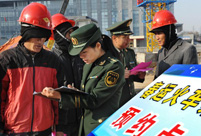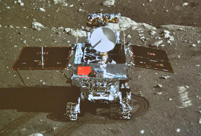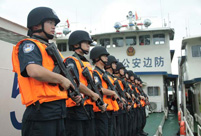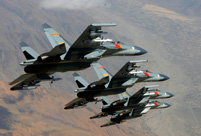 'Jin' named the word of the year by cross-strait netizens
'Jin' named the word of the year by cross-strait netizens Chinese scientific expedition goes to build new Antarctica station
Chinese scientific expedition goes to build new Antarctica station
 Chinese naval escort fleet conducts replenishment in Indian Ocean
Chinese naval escort fleet conducts replenishment in Indian Ocean 17th joint patrol of Mekong River to start
17th joint patrol of Mekong River to start China's moon rover, lander photograph each other
China's moon rover, lander photograph each other Teaming up against polluters
Teaming up against polluters
5.To understand each other’s baseline in the Western Pacific region
The elites from both countries believed that the abstract concept of mutual trust is not so important - they are more concerned about how to truly strengthen bilateral ties. Both sides agreed that China and U.S. are partners and competitors at the same time, or something in between. One U.S. participant speculated that this could signify that U.S. elites feel that the United States and China are at a critical point when bilateral cooperation could be very positive and beneficial, but that tensions could worsen down the road. Therefore, now is the time to take action and implement confidence-building measures to prevent the relationship from deteriorating.
In addition, elite groups from both countries hold different views on how to best serve each other’s interests and guarantee international peace and stability. American elite groups are more inclined to support a unipolar world to continue U.S. dominance, while their Chinese counterparts prefer a multi-polarization system. The difference could represent a major challenge to the bilateral relationship, especially in the Western Pacific region, where China’s economic and military powers continue to increase.
Shi Yinhong, an international problem expert, said: “Some problems can’t be solved immediately. But as long as we understand the core interests and baseline of the other country, we can maintain a respectful attitude.” He added that on the Taiwan issue, China and the U.S. have reached a basic consensus. Now the most important thing is the strategic space of China and U.S. in the Western Pacific region, where China’s strategic vision may influence America’s strategic reality.

 People prepare for upcoming 'Chunyun'
People prepare for upcoming 'Chunyun'  Highlights of Beijing int'l luxury show
Highlights of Beijing int'l luxury show Record of Chinese expressions in 2013
Record of Chinese expressions in 2013 China's moon rover, lander photograph each other
China's moon rover, lander photograph each other 17th joint patrol of Mekong River to start
17th joint patrol of Mekong River to start Spring City Kunming witnesses snowfall
Spring City Kunming witnesses snowfall Heritage of Jinghu, arts of strings
Heritage of Jinghu, arts of strings Weekly Sports Photos
Weekly Sports Photos PLA elite units unveiled
PLA elite units unveiled  China's stealth fighters hold drill over plateau
China's stealth fighters hold drill over plateau Chinese navy hospital ship's mission
Chinese navy hospital ship's mission  "Free lunch" program initiated in NW China
"Free lunch" program initiated in NW China  Rime scenery in Mount Huangshan
Rime scenery in Mount Huangshan DPRK's Kaesong Industrial Complex
DPRK's Kaesong Industrial Complex 'Jin' named the word of the year
'Jin' named the word of the year Day|Week|Month